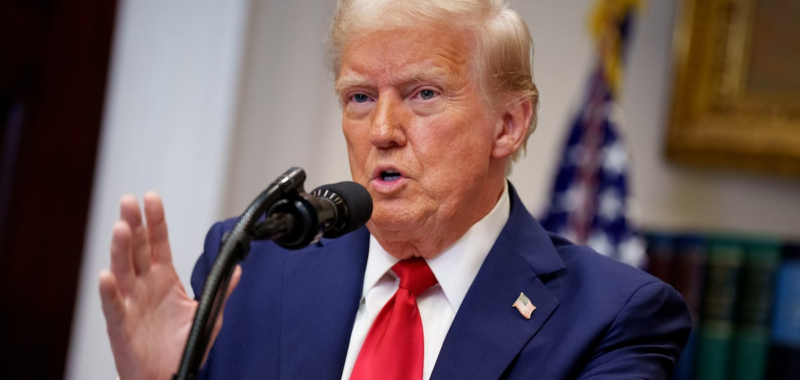
President Donald Trump said he plans to be âvery niceâ to China in any trade talks and that tariffs will drop if the two countries can reach a deal, a sign he may be backing down from his tough stance on Beijing amid market volatility.
âIt will come down substantially but it wonât be zero,â Trump said Tuesday in Washington, following earlier comments from Treasury secretary Scott Bessent that the standoff was unsustainable. Trump added that âweâre going to be very nice and theyâre going to be very nice, and weâll see what happens.â
Trump also said he didnât see the need to âplay hardballâ with Chinese leader Xi Jinping and that during discussions he wouldnât raise Covid-19 â an issue that is politically sensitive in Beijing. The White House recently launched a website that suggested the virus came from a lab in China, irking the nationâs diplomats.
Foreign Ministry spokesman Guo Jiakun said âthe door for talks is wide open,â at a regular press briefing in Beijing on Wednesday, reiterating that trade wars donât have any winners. While Trump has repeatedly sought to get Xi on the phone, China wants the two sides to work out the contours of an agreement before the leaders speak.
Chinese stocks traded in Hong Kong closed 2.1 percent higher on optimism that tensions with the US may soften, while the offshore yuan was last up 0.2 percent versus the dollar.
Trumpâs comments come as US stocks and Treasuries have been battered since he rolled out sweeping tariffs on April 2, later announcing a 90-day reprieve for most nations. The 145 percent duties Trump has placed on Chinese shipments this year remain in place, though heâs made exceptions for computers and popular consumer electronics.
âTrump is panicking due to the markets plummeting and still very high US Treasury yields,â said Alicia Garcia Herrero, chief Asia Pacific economist at Natixis. âHe needs a deal and quick. China does not need to offer anything big in such circumstances.â
Xi still hasnât spoken to Trump since his US counterpart returned to office, with no public indication that talks between the worldâs largest economies are taking place, even at lower levels.
Beijing has instead been intensifying its outreach to other countries, even warning them not to strike trade deals with the US that hurt Beijingâs interests. During a meeting with Azerbaijanâs President Ilham Aliyev on Wednesday, Xi reiterated that tariff wars undermine the rights and interests of all countries.
Foreign minister Wang Yi told his counterparts in the UK and Austria that Chinaâs stance toward the US aims at not only âsafeguarding its own interests, but protecting international rules and multilateral trade system.â Chinaâs premier, Li Qiang, reportedly wrote a letter to Japanese Prime Minister Shigeru Ishiba this week, calling for a coordinated response to Trumpâs tariffs.
What Bloomberg Economics Says…
âEveryone we visited in Beijing firmly supports the Chinese governmentâs retaliation against the USâs high tariffs. Thatâs a stark contrast to the 2018-2019 trade war, when some favored conciliation. People think itâs impossible to get a fair trade deal with the US without fighting back.
â David Qu.
The Chinese media outlet Cailian called the US presidentâs latest remarks âa sign Trump is already softening stance on his signature tariff policies.â Trump âchickening outâ was among the top trending topics on Chinaâs Weibo social media website on Wednesday.
China had indicated earlier this month it wants to see a number of steps from the Trump administration before agreeing to any discussions, especially reining in disparaging remarks by members of his cabinet. Beijing had earlier expressed displeasure with comments Vice President JD Vance made about âChinese peasants,â with one diplomat calling them âignorant and disrespectful.â
Bessent told a closed-door investor summit that the worldâs two largest economies will have to find ways to de-escalate, which would come in the near future. He also said that it was not the USâs goal to decouple from China, according to people who attended the session.
Still, the Treasury chief said a comprehensive deal could take two to three years to hammer out. He also reiterated his view that China has stifled its consumer economy and favoured manufacturing at the USâs expense, saying that any agreement would require a rebalancing of trade that allowed the US to increase manufacturing.
Negotiations with China over such a deal havenât started yet, he said.
Beijing has sent Peopleâs Bank of China Governor Pan Gongsheng, his deputy, Xuan Changneng, and Finance Minister Lan Foâan to Washington, which this week will host meetings of the World Bank Group and International Monetary Fund. That could create an opening for top Chinese and American officials to exchange views and open the door to trade talks.
Also, one key member to the Chinese team that will negotiate with the Trump administration was likely put in place last week, when Li Chenggang was appointed vice commerce minister and trade envoy.
Henry Wang Huiyao, founder of the Center for China and Globalization research group in Beijing, said Liâs appointment showed âChina is ready to talk,â and Trumpâs comments signalled a âmore reasonableâ tone.
âIâm sure this would get a response from China, so hopefully weâll have a stabilising, cooling period and we can continue our relationship as normal as possible with President Trump,â Wang said.
By Bloomberg News
Learn more:
Explainer: What the US-China Trade War Means for Fashion
President Trumpâs sky-high tariffs on China, along with the end of the de minimis tax loophole, have left American fashion businesses scrambling. BoF unpacks the challenges ahead as companies try to navigate the situation.

